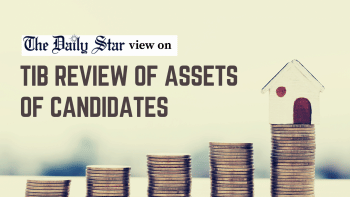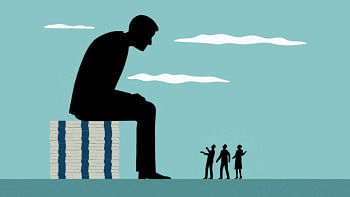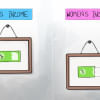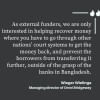Rising inequality will be our doom

The latest Household Income and Expenditure Survey released by the Bangladesh Bureau of Statistics (BBS) has once again brought to light the stark reality of escalating income inequality in the country. Analysing data collected over the period of 2016-2022, it reveals that the top 10 percent of the wealthiest households in Bangladesh now hold 40.92 percent of its total income, which was 38.09 percent in 2016. Similarly, the top five percent of households control 30.04 percent of the total income, up from 27.82 percent in 2016. Concurrently, the bottom 50 percent of households have seen their income share drop to 19.05 percent, from 20.23 percent in 2016, despite a relative decline in the poverty rate.
Even if we take government-produced data with a pinch of salt, the picture that emerges from these findings is quite alarming. For a nation built on the principle of equality, the widening gap between the affluent and the poor is an affront to our foundational aspirations. It also runs counter to the government's promise of inclusive growth, which it again reiterated in its election manifesto. The truth is, over the years, while the affluent kept amassing wealth exploiting poor financial policies and governance, the underclass—that sad residue of a seemingly prosperous but unequal society—kept seeing their share of promised benefits taken away from them.
The surge in inequality, experts say, has been largely due to unchecked corruption and systemic irregularities that resulted in various scams in the banking sector, tax evasion, money laundering, and so on. Another underlying reason has been the dearth of job opportunities for ordinary people. Two recent reports—by the Centre for Policy Dialogue (CPD) and the Transparency International Bangladesh (TIB)—have highlighted how bad the situation is. The first revealed that more than Tk 92,000 crore have been syphoned out of our banking sector through 24 major loan scams since 2008, while the second showed how the 2024 general election is set to witness the highest number of superrich political candidates, mostly from the ruling party, with many seeing astronomical increases in their wealth over the years. When so much wealth is concentrated in the hands of a few, legally or illegally, the vast majority is bound to fall behind.
If this situation persists, people's suffering and living crisis will only continue to grow. The BBS survey should serve as a wake-up call for a critical rethink of our current development policy, and for the government to ensure equitable income/wealth distribution by preventing corruption and undertaking pro-people reforms.


 For all latest news, follow The Daily Star's Google News channel.
For all latest news, follow The Daily Star's Google News channel. 










Comments